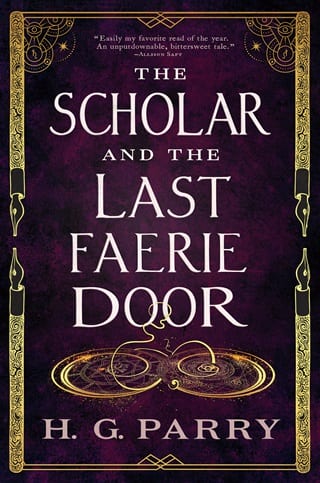Epilogue
I thought about ending my story there. What happened afterwards is history: too big and unwieldy to tell on the one hand, and on the other, told too many times, in too many different forms.
There are full transcripts, should anyone care to read them, of the months-long trials that Hero and Eddie and I underwent, Sam and Lady Winter and a few surprising others fighting for us every step of the way, before the Board were forced to accept that Hero had been under faerie control and the blame was laid conveniently at the feet of the absent minister for magical enforcement. There are newspaper articles of the scandals that emerged during that trial, including the secret at the heart of Camford and the erosion of the Board afterwards. There have been books written, prematurely I think, about the hard year following the breaking of Camford, when magic dulled in our blood and the university scrabbled to reform with nothing but an idea to hold it together.
It was a hard year—an impossible year, a year I would have thought none of us could have survived had I not already lived through so much worse. As it was, once the trial was over, the three of us hid up at the Pendle Hill farm and for weeks did nothing very much except talk and sleep and go for long walks and help on the farm and eat and sleep and talk some more. There was something strangely idyllic about this, amidst the grief and the shock and the sick dread of what the world had become. We hadn't been together in such a long time. Richard joined us, of course, and in a strange way he kept the missing place Alden left from feeling too stark.
"I hope you don't mind us all being here," I said to Matthew once. "It's just that we've nowhere else to go. Everything feels broken."
He gave me the look he's reserved since I was a toddler for when I was being spectacularly stupid. "Clove, this is your home ," he said, and I realised that it was true. Perhaps it had never been Pendle Hill I was running from, but rather some version of myself I feared I'd become if I stayed there; I'd outgrown her now, and so at last I'd grown back into Pendle Hill. "It's where your daughter lives. It's where your family are. Of course you can all stay here as long as you need. Besides," he added, more gently, "you think I don't know what it feels like when everything breaks?"
I might have stayed there forever, all my ambitions smashed. Eddie had never wanted anything more than to hide from the world in the first place. It was Hero who ended it. One morning I came down to breakfast to find her and Eddie and Richard already there. She looked very different now to how she had the day we had met—pale, gaunt, dressed in one of Jemima's old farm jumpers, her hair pulled back into a loose knot. But the determination was back on her face, and with it the glint in her eye that I loved, the one that invited everyone to challenge her and see what they got.
"I've been thinking," she said. "It's time to go."
"Why?" I asked—not because I disagreed, but because I wanted to know what she would say.
"Because they're putting the world back together out there," she said. "And if we're not careful, they'll put it back in the same old shapes. We need to go out there and fight for it."
"I don't think there's a lot we can do on our own," Eddie said cautiously.
She snorted. "Of course not. Still, we can do our part."
We did. That's another thing worth writing about: the way the line between Families and commonplace magic users has blurred over the long years, far too slowly yet inexorably, like a tide coming in. But we've lived that, and it doesn't need telling. If you're reading this book, you must have lived it too, perhaps without even being aware of it. Magic still isn't common knowledge, but it's less and less secret. There are whispers on the street now, books of magic left in libraries and in old bookstores where someone looking for them might find them. The cracks between the old order and the new are widening, and stories seep out. Most people don't want to know, or need to know, but one by one, the ones who do come to seek us out.
Perhaps you, reading this book right now, are one of them. If you are, and you're ready to learn, find us. At the time of writing, a full third of our students of magic come from ordinary families. I hope it will be more and more each year, while those able to identify as Family grow less and less, until one day we'll find ourselves standing in the midst of unfamiliar territory without knowing how we got there. We have such a long way to go.
There are other things I could mention, too, that nobody else has written of, but those are too many. When I try to get them down, I can only catch fragments, like the Imagist poets Hero and I used to read aloud on my floor at Chancery Hall. The books from Lady Winter's library, sending up clouds of dust as she sorts through to find ones to replace those lost in faerie country. Rose's smile the first time I came home, and the rain on the roof of the barn as I sit there with Matthew late at night. Hero battling through months of nightmares on my couch, then emerging on the other side to begin to travel the world. Eddie and Richard in their cottage in the Highlands with flowers growing wild throughout the house. All these things are too small and unruly to push into a narrative, though perhaps it would be worth trying.
And yet, after all, I have a few things left to say.
I write this sitting in a library, as I was all those years ago when Alden Lennox-Fontaine sat beside me. It isn't the Camford Library, of course, although it's a Camford library, one of many in the smaller universities that have blossomed and thrived all over the country since Camford itself fell. Some of these universities are made of new brick and some of old stone; some of them are in still more modern buildings of metal and glass. This one is in Manchester, though I teach at several these days, including the one Rose attends in Durham. There are students about me, talking in soft murmurs, and sunlight through the great high windows that transforms the redbrick walls to soft russet. It's the world Alden, so clever and so scared, wasn't certain he could face. I wish with all my heart he had. It's a difficult world, a dangerous world, especially now with a new war looming on the horizon. Still, the world has always been that, beneath the surface. Perhaps we could have helped him through it, and he could have helped us.
This book will be the first time Rose reads about Alden. I kept my promise to him, for her sake rather than for his, waiting for the time she was old enough to understand—which was foolish, because I'm not old enough yet myself, and never will be. But Rose is a scholar now, as am I, and if I've learned one thing, it's that it's the duty of a scholar to find the truth.
I miss Alden desperately, despite everything. I miss Ashfield. I still miss Camford, every day. It comes in intense jagged waves, like grief: One hour I can believe I'll never think of it again, the next I'll catch a glimpse of an oak tree or a stone wall or the smell of old books, and I'll be unable to breathe. Yet it hurts less than it might, because of the dreams.
I never know what nights they'll come. I'll close my eyes, and when I open them, I'll be standing somewhere, anywhere, in Camford. The crooked streets and student buildings and winding river will sparkle under a crisp sky, and the wind will buffet my hair and clothes as though it's welcoming me home. There are no people there, and the plants are even thicker on the ground, and yet it's whole again and perfect, the books back on the shelves and the chalk lying beside the blackboards as though it's just waiting for the end of the holidays. I can wander all night through the empty buildings, skin tingling and heart opening wide. Often I've spent hours in the library, reading the books I've not found it easy to relocate in the real world, and when I wake, the knowledge is always fresh-printed in my head.
At first I thought it was because I was still the ward of Camford Library, that as long as I still live, the library will live too. Lately, though, I've wondered if it isn't something more. Sometimes Hero's work on faerie language comes from places I'm not sure even her experience encompasses, or Eddie's breakthroughs on Camford's plants slip into the uncanny. Even Matthew seems to be learning a little too much and too fast. I've never spoken about those dreams to anyone before, not even to the people I love most in the world, and they've never mentioned them to me. I'm too afraid that if I do, the dreams will go away again, and I have so much more to learn first.
Thomas Lennox-Fontaine is living in York now, about an hour's drive from his parents' new house. I've spoken to him often—he's a kind, brave, honourable young man, with Alden's playfulness, and he's recovered well from his time away, although on certain nights his gaze will shift as though he's hearing something nobody else can hear. He remembers nothing of his years in the faerie court and can shed no light on why he was returned.
But I remember the moment when the worlds were falling apart, and I held on to the faerie in Hero's body. Let us go , I said, and we'll see the last of the doors are closed forever . There was no bargain struck, not in any magical sense. And yet I made a promise, and together we kept it, Alden most of all. And the faerie of the silver birch kept her promise too, and let us all go, every last one. If I'm right, it's a different exchange of magic to any that's ever happened between humans and the fae, a deal based on trust and goodwill and not on mutual threat. Nothing may ever come of it; if it does, it likely won't be for a very long time. We broke trust with each other hundreds of years ago, after all. It might take hundreds more to earn it back, even thousands. But as far as I know, no faerie has ever lived eight years in a human body and returned to faerie country. If Hero can learn to understand the fae from that, perhaps they've learned to understand us.
It's nothing substantial, I know. Dreams and theories, nothing more, and definitely nothing that a Camford scholar would consider evidence. Officially, nobody has seen or heard from faerie country since the Second Accord. The doors are closed, the locks are unbroken. Faerie magic is being taught again only as theory. Everyone agrees that the fae are best left alone. We have enough problems of our own, in this fragmented and glittering age we've created.
There's just one thing, one solid thing, that might mean nothing or everything. A few years ago, a tree began to grow on the ruins of Ashfield. A tall, slender tree, with a silvery bark and small dark leaves like those on the great oak at Camford. It has yet to flower, and nobody, not even Eddie, can tell us what will happen when it does. For now, it puts down roots, and grows, and waits, a relic of the old world and a promise of something new.
 Fullepub
Fullepub 



